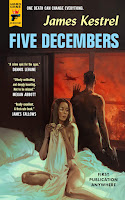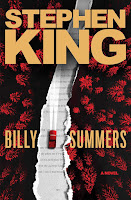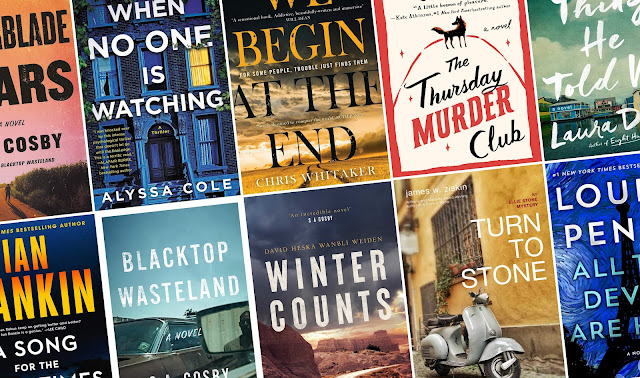J. Kingston Pierce wears an abundance of hats. He’s the editor of both The Rap Sheet and Killer Covers, the senior editor of January Magazine, and a contributing editor of CrimeReads.
• We Begin at the End, by Chris Whitaker (Henry Holt):
Characters trapped in a small town, trapped within small expectations, and often trapped in and by a collective past so fixedly delineated as to resist examination propel this complexly plotted, unexpectedly poignant thriller. Walker, or “Walk” (no first name given), is the veteran police chief of Cape Haven, a northern California coastal burg slowly forfeiting its idiosyncrasies to tourist demands. He’s preparing to welcome back a childhood friend, Vincent King, who has been released after
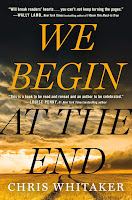
spending three decades in prison following the death of a little girl, Sissy Radley. Naïvely, Walk hopes Vincent’s return will bring healing to his town; in fact, it brings only hardship. Sissy’s elder sister, the still-beautiful but self-destructive Star—Vincent’s ex-girlfriend and now the neglectful parent to two fatherless children, 13-year-old Duchess and 5-year-old Robin—is murdered in the wake of Vincent’s arrival, and the ex-con appears responsible. Again. However, neither Walk nor the rage-consumed, grown-up-too-soon Duchess (who habitually introduces herself as “the outlaw Duchess Day Radley”) accept that explanation; instead, they set out amid hazards to ascertain the truth behind Vincent’s alleged crimes. Duchess is the more compelling player—both needing and angry at her mother, pugnaciously protective of her brother, and obstinately distrustful of anything resembling affection. Yet Walk, with his worsening physical ailments and deeply entrenched loneliness, executes a more nuanced, though equally engaging evolution as this stunning tale of loss, dejection, and defiant hope patiently discloses its surprises. Whitaker’s poetic prose only serves to smooth the ride. Published last year in the UK,
We Begin at the End has already won the
British Crime Writers’ Association’s 2021 Gold Dagger award and the
Theakston Old Peculier Crime Novel of the Year award. It should be strong contender for U.S. prizes in 2022.
• Blackout, by Simon Scarrow (Headline UK):
Philip Kerr is responsible for my being so fond of World War II-era crime fiction. His novels about Berlin homicide detective-turned-private eye
Bernie Gunther (beginning with 1989’s
March Violets and concluding with
Metropolis, published 20 years later) were ripe with the period’s public fears and private secrets, and gave us in Gunther an alternately cynical and romantic outsider, an advocate for liberal justice, and a German Everyman who deftly defied pressures to join the Nazi Party. Criminal Inspector Horst Schenke of the Kriminalpolizei, the Kripo—the star of
Blackout—likewise steers clear of Nazi affiliations.

That makes him an ideal candidate to investigate the rape and murder, in December 1939, of Gerda Korzeny, an erstwhile actress of part-Jewish descent who’s linked romantically with Reich propaganda chief Joseph Goebbels. If Schenke, with his minor aristocratic background and history as a race-car driver (before a crash ended his career), should expose anything too uncomfortable to Adolf Hitler’s fascists, he’s dispensable. It doesn’t take long for what had appeared to be a straightforward murder inquiry to become something more bewildering, with additional corpses turning up amid Berlin’s newly instituted blackouts and suspicions brewing that the person responsible for this string of slayings may be prominent in Hitler’s regime. Author Scarrow, who is best known for penning Roman historical fiction, captures the peculiar subtleties of the German capital in those early days of the war, before its citizens realized what privations would result from the fighting. He doesn’t have quite the wit Kerr boasted, nor is his man Schenke such a contradictory and watchable figure as Bernie Gunther. But Scarrow
has said that he’s working on sequels to
Blackout, so he’ll have more time to find this series’ stride. I very much look forward to seeing what he comes up with next.
• Daughters of the Night, by Laura Shepherd-Robinson (Mantle UK):
I’ll admit, I hesitated to pick up
Daughters of the Night. I loved Shepherd-Robinson’s first historical mystery,
Blood & Sugar (2019), but knew that in this sequel, she had switched protagonists. Gone was aspiring politician Captain Henry Corsham, who in the previous yarn had so enthrallingly explored the horrors of the Georgian-era slave trade, to be replaced here by his wife, Caroline (“Caro” to her friends), a fairly minor member of
Blood & Sugar’s cast. As it turns out, that substitution of a woman’s viewpoint was far from disappointing; instead, it lends
Daughters an intimacy and empathy it would surely have lacked had Henry been given its helm. As this story begins, it’s 1782 and

Captain Corsham is away in France on some hush-hush diplomatic assignment. Caro, meanwhile, has arranged a nighttime rendezvous with an Italian countess she hopes will aid her in a troubling personal matter ... only to discover that woman stabbed and dying in a south London park. Soon afterward, the “countess” is revealed to have been Lucy Loveless, a high-end prostitute catering to wealthy callers, and London’s quasi-police force—the Bow Street Runners—promptly loses interest in her savage demise. Caro has reasons for wanting justice done, though, and employs a thief-taker named Peregrine Child to dig further into the killing. What follows is a danger-fraught, elegantly rendered account that transports Caro and Child into both the sumptuous and seamy sides of London, as they probe the depths of Britain’s sex trade and through their efforts threaten to expose powerful men who benefit from it. Were this the plot of a modern narrative, it might seem trite; but
Daughters of the Night imparts a historical foreignness to the whole affair that enhances its twists and intrigues. Shepherd-Robinson deserves special credit for making clear that, while 18th-century
filles de joie were limited in their rights and freedoms, even well-off women such as Caro Corsham had little control of their finances, and could be disgraced and ostracized for contravening moral norms. Two such thrilling tales as Shepherd-Robinson has given us merit a third outing for the Corshams, yet the author has suggested she’ll pen a standalone next.
 • The Dark Remains, by William McIlvanney and Ian Rankin (World Noir):
• The Dark Remains, by William McIlvanney and Ian Rankin (World Noir):
Glasgow, Scotland, teeters on the knife edge of inter-gang warfare in this unforeseen fourth novel about cop-cum-philosopher Jack Laidlaw.
The Dark Remains is a prequel to McIlvanney’s first “Tartan noir” novel, 1977’s
Laidlaw, but was left unfinished when the working-class-born wordsmith
died in 2015. Fellow Scot Rankin, whose award-winning
John Rebus detective series was inspired by McIlvanney’s work, completed the story—and in wholly satisfying fashion. The year is 1972, and Laidlaw—never a team player, yet good at his job—is the “new boy” in the city’s Crime Squad. He’s tasked with solving the alleyway slaying of a criminal lawyer who had enjoyed the protection of a local mob boss. Eschewing routine investigative procedures, Laidlaw sharp-elbows his way directly into the thick of Glasgow’s underworld trenches to discern who benefits most from the victim’s passing. More even-tempered Detective Sergeant Bob Lilley tags along for the ride, supplying readers—and perhaps Rankin before us—with fresh eyes on Laidlaw’s professional dedication, moldering home life, and endangered moral universe. “Maybe he’s a streetsman,” Lilley muses of his new partner, “the way Davy Crockett was a woodsman. Davy could read all the signs in the wild, he’d lived there so long.” Laidlaw’s path amid the deceptive leads and broken figures in
The Dark Remains may be different, slightly less poetic than how McIlvanney would’ve engineered things, but it’s hardly less rewarding.
• The Good Turn, by by Dervla McTiernan (Blackstone):
Crime fictionists who can consistently deliver sinuous, atmospheric yarns boasting clever resolutions are never to be discounted. Which explains why I keep reading works by Irish-born Australian writer Dervla McTiernan. In this third novel starring Galway, Ireland, police detective Cormac Reilly (introduced in 2018’s
The Ruin), her protagonist—under strain in his personal relationship, and
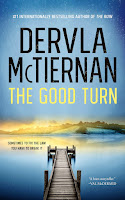
long resented by imperious superiors and lesser colleagues alike—is suspended from duty after the search for an abducted girl goes appallingly tits-up. Much of the blame for said fiasco, however, falls on an ambitious member of Reilly’s team, Peter Fisher, who—hoping to avoid prosecution—agrees to be exiled to a remote coastal hamlet where his estranged, overbearing father serves as top cop, and where “the main occupation of every inhabitant aged forty and older was minding each other’s business.” While a restive Fisher raises uncomfortable questions regarding the supposedly uncomplicated murder of two local farmers, Reilly is drawn into a corruption probe targeting the Galway constabulary. With multiple plot lines, intricately constructed; investigative roadblocks, captivating characters, and the heady promise of imminent vindication; and only a couple of suspect coincidences,
The Good Turn is something of a master class in developing modern police procedurals.
Finally, one work from the non-fiction stacks …
• The Case of the Murderous Dr. Cream: The Hunt for a Victorian Era Serial Killer, by Dean Jobb (Algonquin):
It was my interest in Jack the Ripper that introduced me years ago to
Thomas Neill Cream, a Glasgow-born, Montreal-educated doctor turned serial poisoner. Newspapers reported that as the trap was sprung at Cream’s 1892 hanging, he cried, “I am Jack…” A death-drop confession? Journalist Jobb thinks not, for as he notes in this assiduously researched,

altogether consuming chronicle, at the time of the Ripper slayings in 1888, Cream was behind bars in Illinois for having offed his putative mistress’ husband. That was still early in an unsavory career that found Cream preying primarily on women, both those he sought as lovers and those he thought unworthy of mercy (i.e., prostitutes). A foppish, debauched, and self-destructively arrogant sociopath, Cream hid behind his standing as a physician and left behind a string of up to 10 victims—most of them done in painfully with strychnine—that stretched from Canada to Chicago to England. That he got away with his predations for so long, and even continued taking lives in London after his U.S. incarceration for murder, can be largely attributed to what was then a notorious lack of coordination between police departments and official distrust of female witnesses’ statements. This is the finest study of Victorian-era misdeeds and social dysfunction since Hallie Rubenhold’s
The Five (2019).
Other 2021 Favorites: Silverview, by John le Carré (Viking);
The House on Vesper Sands, by Paraic O’Donnell (Tin House);
Widowland, by C.J. Carey (Quercus);
Razorblade Tears, by S.A. Cosby (Flatiron);
How to Find Your Way in the Dark, by Derek B. Miller (Mariner); and
The Shadows of Men, by Abir Mukherjee (Pegasus).
READ MORE: “
Arresting Crime Fiction of 2021,” by J. Kingston Pierce (January Magazine).
 United States precipitated by the virulent spread of disinformation. At least on the health front, people now seem more settled as regards mask wearing, social distancing, and packing along proof of their vaccinations if they wish to dine out or attend large events. We can only hope those other contentious issues will be resolved with similar or greater public support.
United States precipitated by the virulent spread of disinformation. At least on the health front, people now seem more settled as regards mask wearing, social distancing, and packing along proof of their vaccinations if they wish to dine out or attend large events. We can only hope those other contentious issues will be resolved with similar or greater public support. • Riku Onda (The Aosawa Murders)
• Riku Onda (The Aosawa Murders) • Laurence Bargreen (In Search
• Laurence Bargreen (In Search 

